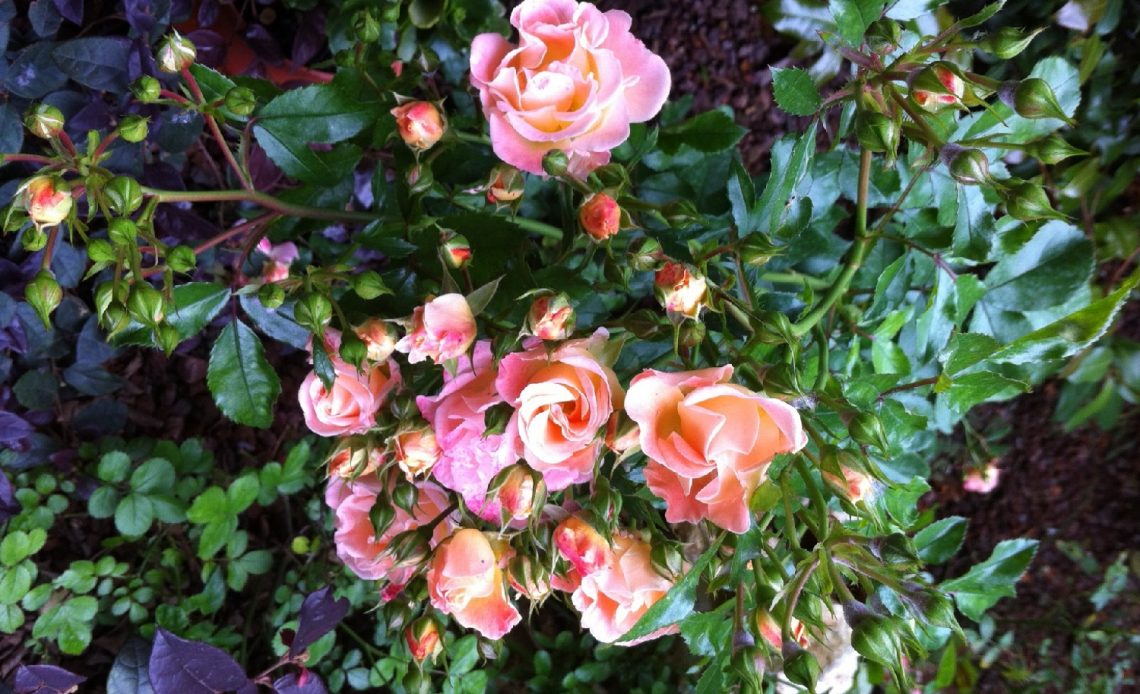

We’re here to help! Wild Yards is a completely free website that is 100% dedicated to helping you create a wildlife-friendly, sustainable yard. Read more
WildYards is reader-supported. When you buy a product through a link on our site, we may earn a comission. Every product is independently selected by our (obsessive) editors and our reviews are unbiased and objective. Read more about our mission or our privacy policy.
For as beautiful as they are, you would think that roses would be hard to take care of. But that’s not true. These iconic flowers are incredibly low-maintenance. As long as their basic growing requirements are met, roses can grow like weeds on their own. Still, roses can benefit tremendously from regular fertilization. Many landscapers swear by coffee grounds, but do roses like coffee grounds, or is this just a myth?
Roses do, in fact, like coffee grounds. Coffee grounds contain an ideal ratio of nitrogen, potassium, and calcium that roses are just crazy about. While coffee grounds can safely be used to feed roses, how often you should use coffee grounds to feed your roses depends on the nutritional quality of your soil.
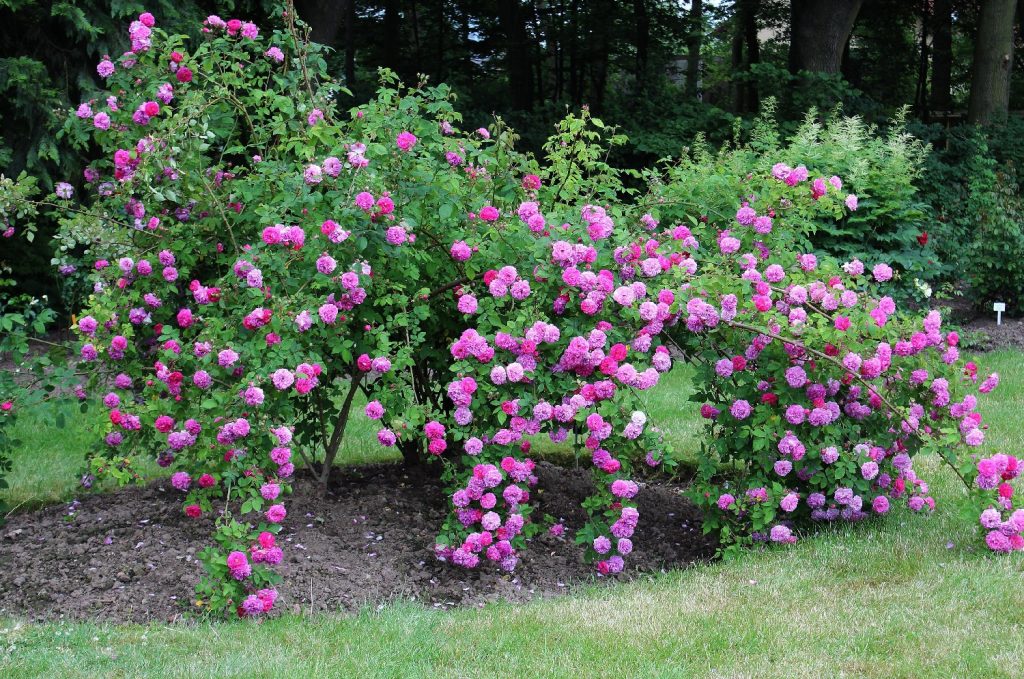
What do roses need to grow?
Before we talk about why coffee grounds are a great natural fertilizer for roses, it’s important to understand what roses need to thrive. While growing requirements may vary slightly depending on their variety, in general, roses grow best when planted in full sun in nutrient-rich soil that drains well.
Roses need to stay hydrated. They like to be watered every second or third day during the cooler months. In the summertime, most roses require daily watering. This is especially the case during droughts. Roses prefer to be planted where they can receive plenty of sunlight. But intense heat causes moisture loss, resulting in dying foliage and faded blooms. If you live in a warmer growing zone, plant your roses where they have some shade in the afternoon.
It’s best to plant roses in neutral soil that has a pH of 6 or 7 and contains a moderate amount of organic matter. Homemade compost consists of biodegradable materials that improve soil fertility and help keep things loose so roots can grow more easily. It’s perfect for amending sandy or clay-rich soils to make them more suitable for roses.
While roses aren’t nearly as picky as other ornamental plants, like philodendrons, they still benefit from proper care. Adequate hydration and regular fertilization are key to flower production. If you frequently use rose petals in home remedies and DIY skincare recipes, taking the time to meet your rose’s nutritional needs can give you plenty of rose blossoms to play with.
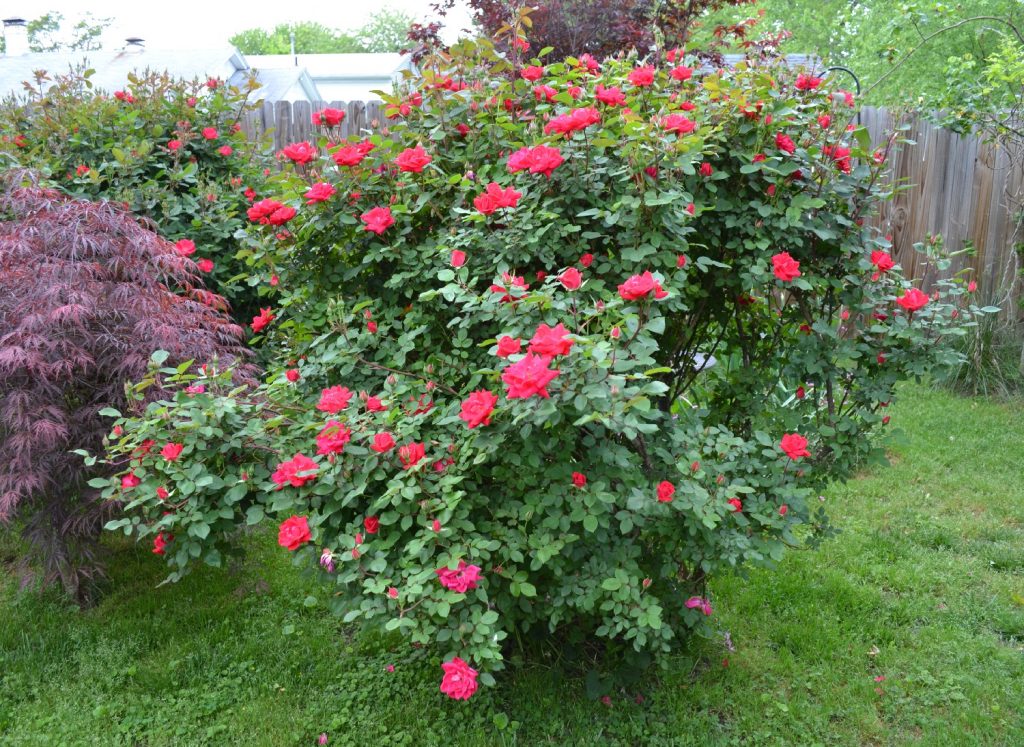
Why do roses like coffee grounds?
There are several reasons why roses benefit from coffee grounds. The first is that coffee grounds are rich in three valuable nutrients that roses need to grow: nitrogen, potassium, and calcium. Coffee grounds contain an ideal ratio of these three ingredients. In fact, the ratio of nitrogen to potassium to calcium in coffee grounds is almost the same as the ratio of these three nutrients in commercial rose foods. So coffee grounds are a cost-effective, all-natural alternative to harsh chemical fertilizers.
The second reason why roses like coffee grounds is because they’re acidic with a pH of 4.8 to 5. Roses grown in slightly alkaline soil will display tremendous improvement when given coffee grounds because it has a balancing effect on the soil’s pH, bringing it to the neutral range that roses prefer.
But even roses planted in acidic to neutral soils can benefit from being fertilized with coffee grounds. If the soil is nutrient deficient, replenishing minerals help boost flower and foliage production. Most rose varieties are capable of adapting to slightly acidic soils, particularly if they’re nutrient-rich.
Are coffee grounds good for the soil?
As it turns out, coffee grounds aren’t just good for rose bushes, they’re good for the soil itself. Used coffee grounds are a common ingredient for homemade fertilizers because they’re a valuable source of carbon. This makes them an ideal brown matter for compost bins. But what exactly does carbon do for plants, anyway?
Carbon is essential for energy production. Carbon atoms bind with other atoms to create fats, proteins, and carbohydrates that plants (and other living things, for that matter) need to stay healthy. Without carbon, leaves become stunted and have poor pigmentation. So carbon is needed for plants to produce full, lush foliage.
The added nutrients that coffee grounds bring to the soil also boost bacterial activity. The good bacteria in the soil benefit from the increase in nitrogen. Feeding the good bacteria in the soil is an easy way to improve the health of your plants as studies have shown that plants fed compost are more disease-resistant than their unfertilized counterparts.
Do coffee grounds help the soil retain moisture?
Sandy soils are porous. There’s plenty of space for oxygen and water to pass through, which is a good thing if you’re growing drought-tolerant plants like lavender and rosemary. But if you’re growing plants that require plenty of moisture, sandy soils must be amended to help them retain water. Coffee grounds are a cheap and easy way to make sandy soils a better home for roses.
By contrast, clay-rich soils suffer from a lack of porosity. The individual grains of clay soils are so tiny that, over time, they pack together like cement. Clay soils are too compacted for most plants to grow well, so they must be mixed with larger particles to keep them loose. Coffee grounds work well for this purpose, and can quickly turn inhospitable clay soils into an ideal base for your rose beds.
Because coffee grounds help the soil stay hydrated, they tend to attract worms, which is another huge benefit for your plants. Worms aerate the soil making it easier for water and oxygen to get to your plants’ roots. Their castings act as a natural fertilizer, turning the vitamins and minerals in the soil into bioavailable nutrients that are easier for plants to absorb.
Can coffee grounds kill your roses?
Used incorrectly, coffee grounds can kill your roses. They’re such a potent source of nitrogen that sprinkling them around the base of your plants can burn the leaves and roots, causing significant damage. It’s the same with manure. While aged manure is tremendously beneficial for plants, fresh manure is too nitrogen-rich to be of much use.
Coffee grounds can be used to fertilize plants. However, you should never apply fresh coffee grounds to your plants. You must prepare your coffee grounds properly before using them to feed your roses. How can you do that? Let’s take a look!
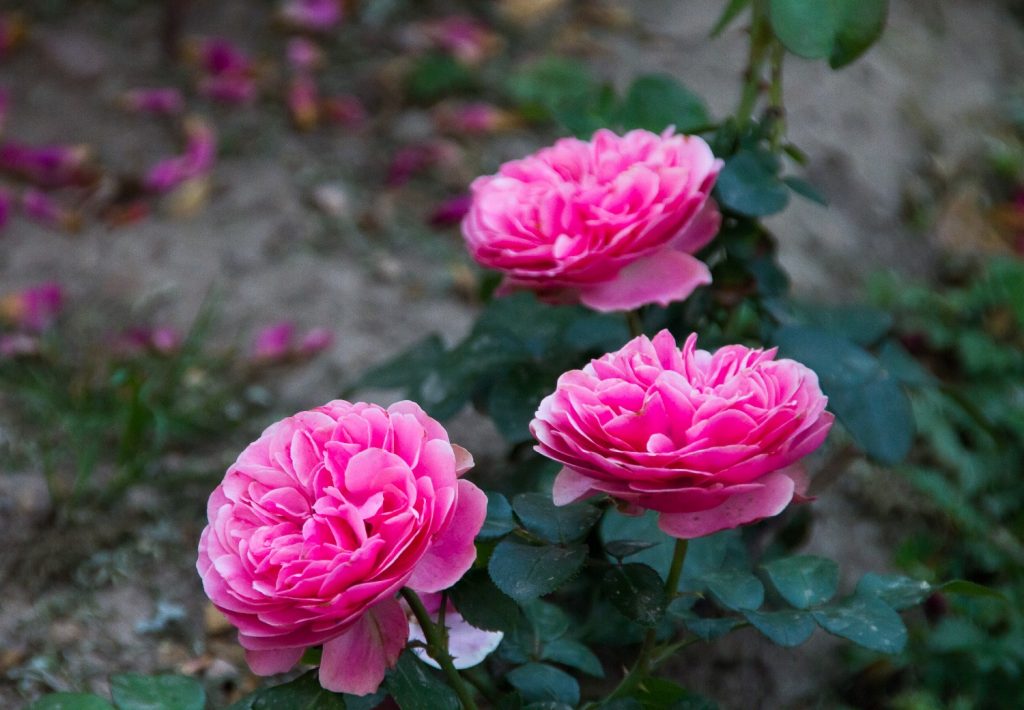
How can you use coffee grounds to feed your roses?
The easiest and safest way to use coffee grounds to feed your roses is by mixing up a bucket of coffee water. Add 1 cup of used coffee grounds to 1 gallon of water and allow it to sit overnight. Strain the grounds in the morning, and give your rose bushes a good long sip of the coffee water. You should notice an improvement in your roses quickly, with deeper green foliage and yellow leaves returning to their normal color within a matter of days.
If you’d like to use coffee grounds to amend your soil and make it more porous, you need to dry them out first. Aging the coffee grounds takes the nitrogen levels down a notch, making them safer for your plants. It also raises the pH of the grounds to a more neutral level.
Add a cup of used coffee grounds to a large sieve and rinse them thoroughly in cool water. Then, spread them out in an even layer on a large baking sheet, and set them in a sunny location outside for 2 to 3 days. Once they’re done, you can store the grounds in an old coffee can. Apply 2 tablespoons of the dried coffee grounds to your rose bushes whenever they need a perk-me-up.
How often can you use coffee grounds to feed your roses?
Do roses like coffee grounds? Yes, but coffee grounds work best when used in moderation. Don’t overdo it, or it can have detrimental effects on your plants. Fertilize rose bushes once a month with coffee grounds, and use an at-home soil pH tester to avoid applying too much at one time.
Which other plants benefit from coffee grounds?
Roses aren’t the only plants that benefit from coffee grounds. Many flowers enjoy the nutrient boost that coffee water and dried coffee grounds provide. Fruits, vegetables, and herbs can also benefit from this all-natural fertilizer. Here’s a list of garden favorites that enjoy a healthy dose of coffee grounds.
- Azaleas
- Black-eyed Susans
- Blueberries
- Cabbage
- Camellias
- Carrots
- Hollies
- Hydrangeas
- Lavender
- Lilies
- Orchids
- Parsley
- Peppers
- Philodendron
- Potatoes
- Radishes
- Rhododendrons
- Rosemary
- Tomatoes
Remember, coffee grounds are slightly acidic, so they can be used to make alkaline soil more neutral, and neutral soil more acidic. Coffee grounds have the potential to benefit many plants, not just the ones listed here. It all depends on your current soil and if or how it needs to be amended. For best results, have your soil tested before making any amendments.
What other natural fertilizers can you use to feed roses?
It’s true that roses love coffee grounds. But roses benefit from a variety of organic materials because they require a lot of nutrients to produce their beautiful, fragrant, nectar-rich blooms. If you don’t want to feed your roses harsh chemical fertilizers, try giving them the following all-natural alternatives instead.
Banana peels
Bananas are a good source of potassium and magnesium, both of which roses need to stay healthy. You can bury several banana peels around the base of your rose bushes to provide them with valuable nutrients as they biodegrade. Alternatively, you can chop up your old banana peels and store them in a bag in the freezer to use as needed.
While you can certainly toss banana peels at the base of your plants, this may backfire. Ants and other insects love sugary fruits. They may flock to the banana peels and eat them before your rose bushes get a chance to enjoy them. So be sure to cover the banana peel bits with soil to encourage decomposition and prevent insect infestations.
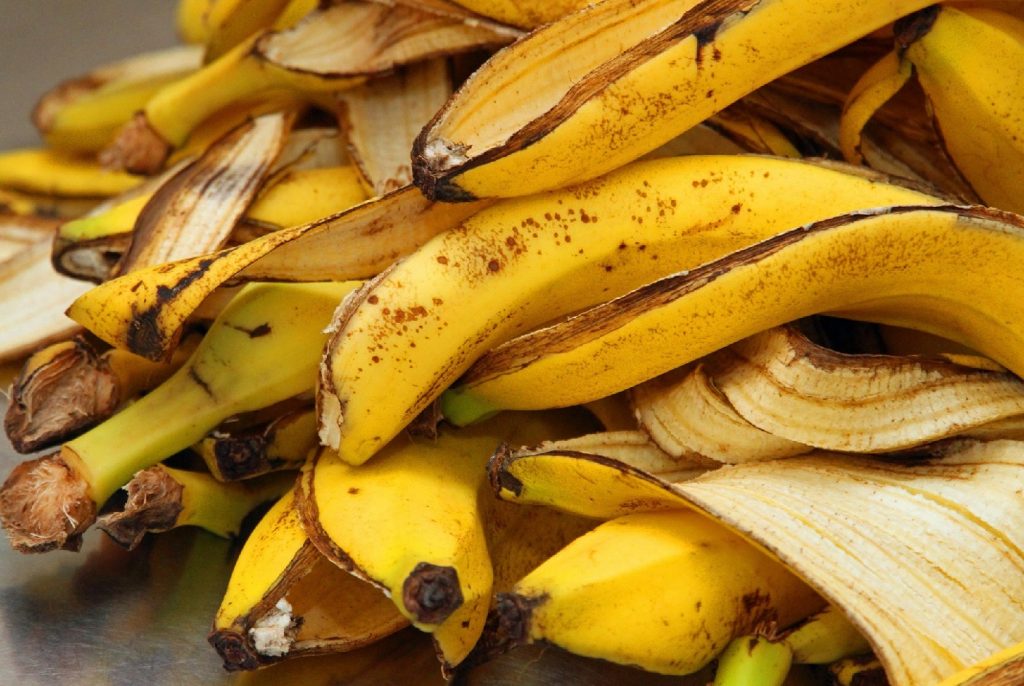
Eggshells
Eggshells are a highly bioavailable source of calcium and phosphorous. Calcium protects the integrity of the plant’s cell walls, while phosphorous works to synthesize proteins. Low calcium results in curled leaves, while phosphorous deficiency produces leaves with brown, bronze, or blue splotches. Simply rinse eggshells, allow them to dry, then toss them into a coffee grinder to pulverize them into a fine powder. Sprinkle the eggshell dust around the base of your rose bushes monthly, or whenever they display signs of calcium and/or phosphorus deficiency.
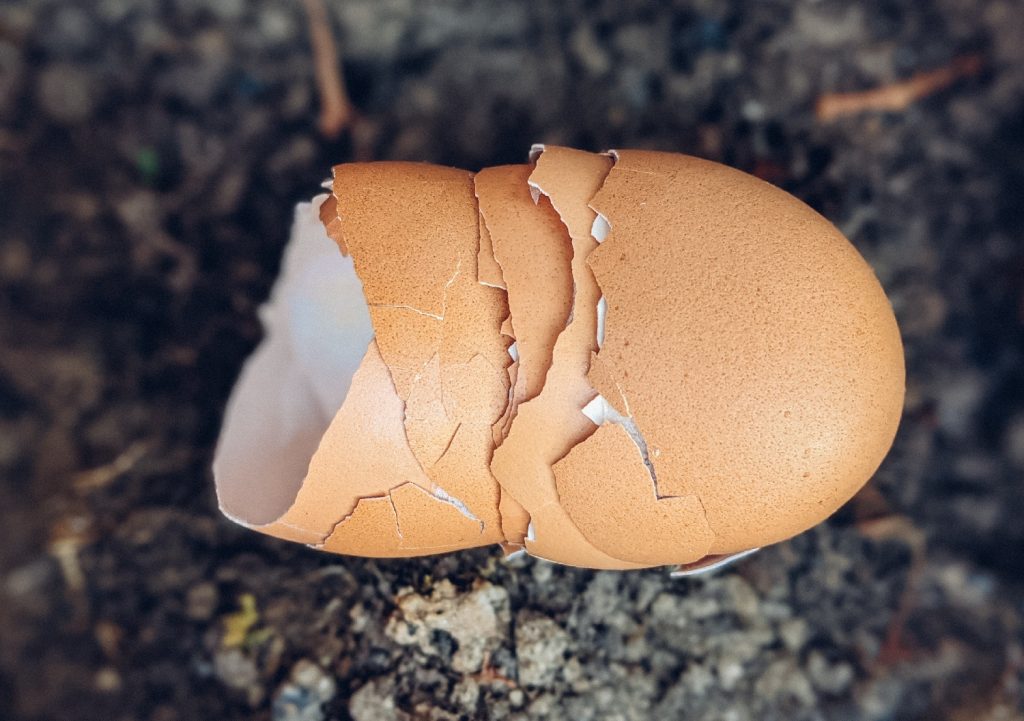
Blood meal
You can find blood meal at garden centers, nurseries, and feed stores. Like coffee grounds, blood meal is a good source of nitrogen, but it’s also rich in iron, which plays a vital role in chlorophyll production. Low iron levels lead to yellowing leaves and foliage loss. Give your rose bushes a level tablespoon of blood meal anytime you notice the foliage losing its luster. Blood meal can be used in tandem with coffee grounds without harming the plants.
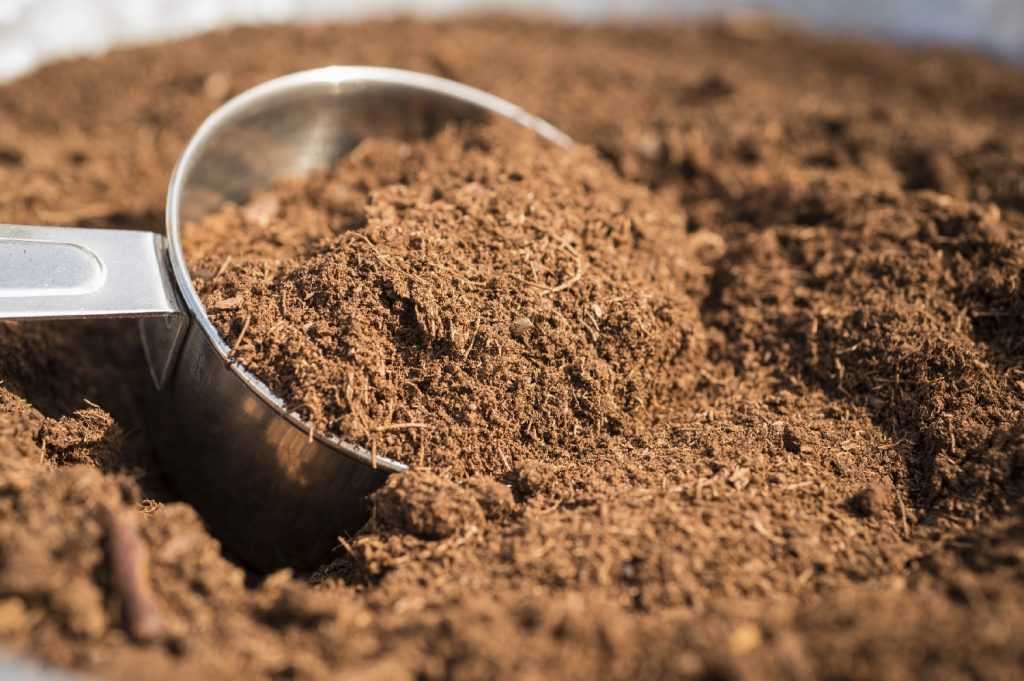
Grass clippings
If your rose bushes are drying out too quickly, and if they’re not showing any signs of nutritional deficiencies, but you still want to keep them healthy, use grass clippings as a natural mulch. Grass clippings contain many of the essential vitamins and minerals that roses need to grow, including nitrogen, phosphorus, and potassium. They help fertilize plants as they break down slowly over time, all while helping the soil retain much-needed moisture.
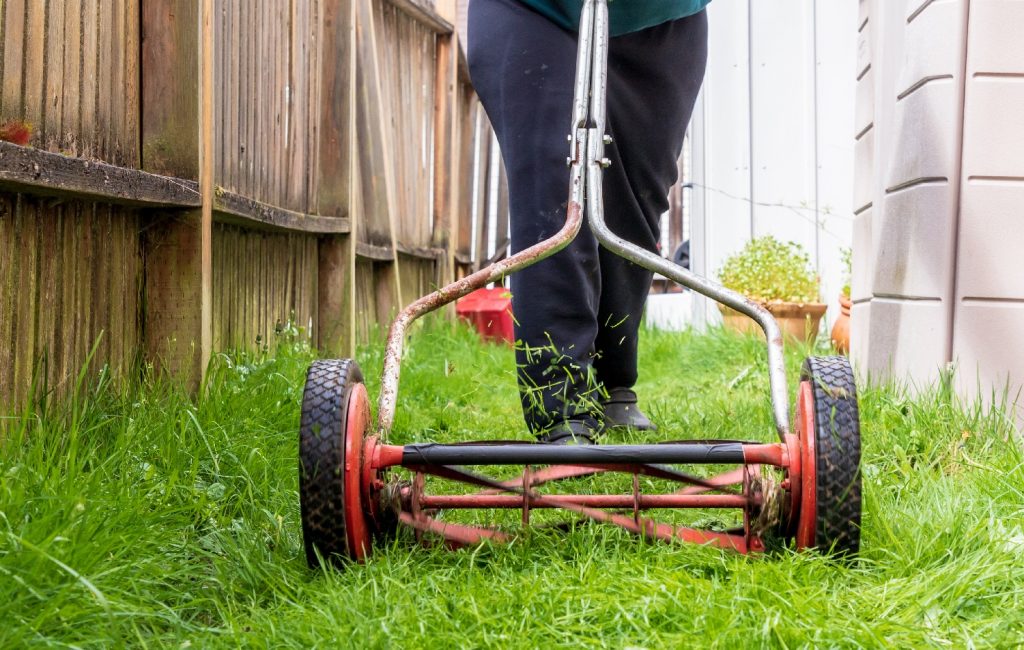
Are there any downsides to using coffee grounds for roses?
If there’s one downside to using coffee grounds for rose bushes it’s that they attract bugs. Coffee grounds can draw the attention of bad worms, like grubs and gnat larvae. Garden pests like aphids, mites, and flies enjoy coffee grounds, too. So be sure to mix up some homemade insecticide to have on hand in case you need to combat these garden pests.
All in all, coffee grounds are an excellent alternative to store-bought fertilizers. They’re cost-effective, nutritionally dense, and easy to prepare. So try giving your roses a sip of their own specially brewed coffee. They’ll reward your efforts by producing lush foliage and a plethora of fragrant blooms for you to enjoy.
